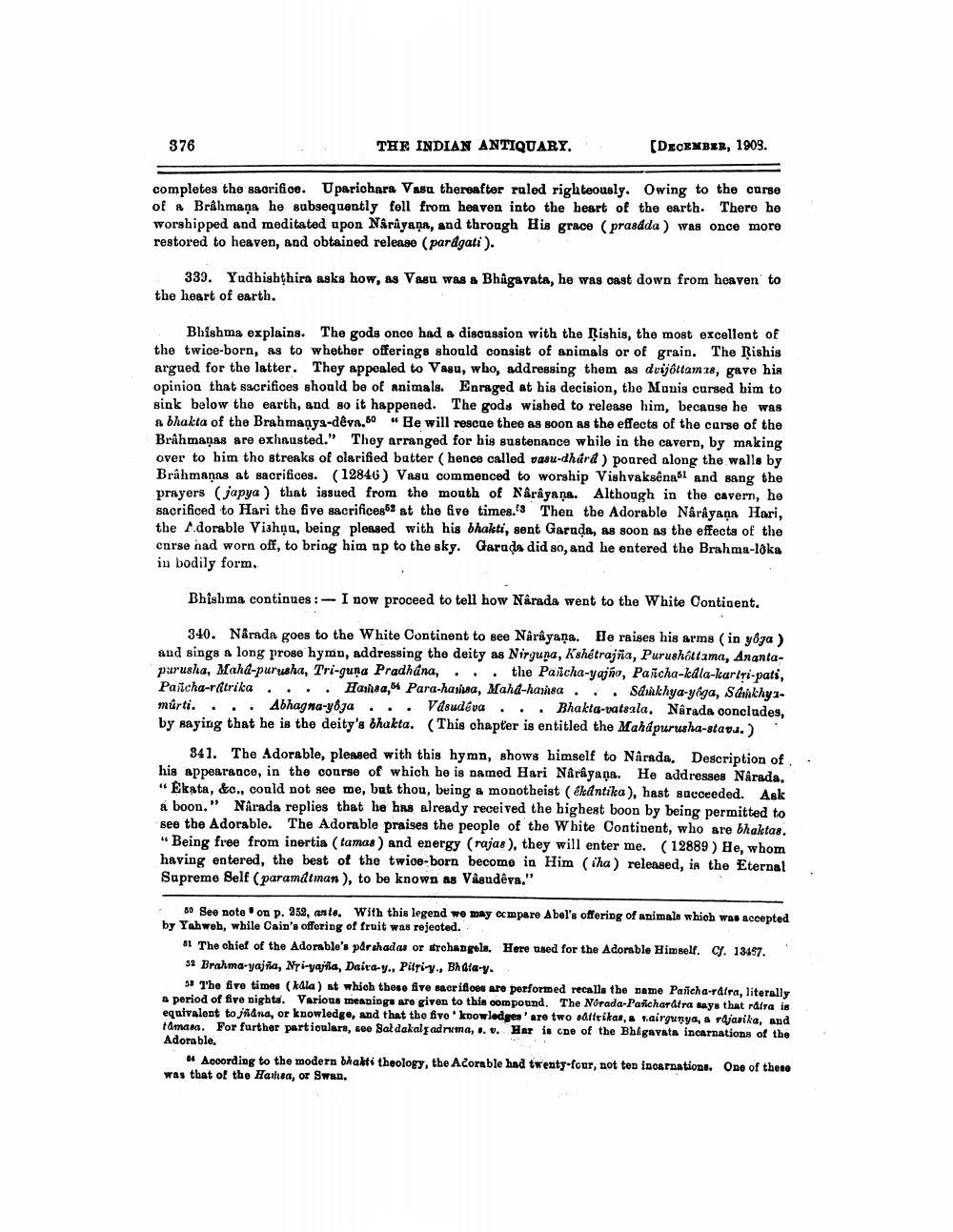________________
376
THE INDIAN ANTIQUARY.
[DECEMBER, 1909.
completes the sacrifice. Uparichara Vasu thereafter ruled righteously. Owing to the curse of a Brahmana he subsequently fell from heaven into the heart of the earth. There he worshipped and meditated upon Narayana, and through His grace (prasdda) was once more restored to heaven, and obtained release (parágati).
339. Yudhishṭhira asks how, as Vasu was a Bhagavata, he was cast down from heaven to the heart of earth.
Bhishma explains. The gods once had a discussion with the Rishis, the most excellent of the twice-born, as to whether offerings should consist of animals or of grain. The Rishis argued for the latter. They appealed to Vasu, who, addressing them as dvijôttam18, gave his opinion that sacrifices should be of animals. Enraged at his decision, the Munis cursed him to sink below the earth, and so it happened. The gods wished to release him, because he was a bhakta of the Brahmanya-dêva,50 "He will rescue thee as soon as the effects of the curse of the Brahmanas are exhausted." They arranged for his sustenance while in the cavern, by making over to him the streaks of clarified butter (hence called vasu-dhárd) poured along the walls by Brahmanas at sacrifices. (12846) Vasu commenced to worship Vishvaksênal and sang the prayers (japya) that issued from the mouth of Narayana. Although in the cavern, he sacrificed to Hari the five sacrifices52 at the five times.'s Then the Adorable Nârâyana Hari, the Adorable Vishnu, being pleased with his bhakti, sent Garuda, as soon as the effects of the curse had worn off, to bring him up to the sky. Garuda did so, and he entered the Brahma-loka in bodily form.
Bhishma continues: I now proceed to tell how Nârada went to the White Continent.
340. Narada goes to the White Continent to see Narayana. He raises his arms (in yoga) and sings a long prose hymn, addressing the deity as Nirguna, Kshetrajña, Purushottama, Anantaparusha, Mahd-purusha, Tri-guna Pradhana,... the Pancha-yajña, Pancha-kala-kartri-pati, Pancha-ratrika Hamisa, Para-hashsa, Mahd-hansa... Sakhya-yoga, Sankhyamûrti.... Abhagna-yoga... Vasudeva... Bhakta-vatsala. Narada concludes, by saying that he is the deity's bhakta. (This chapter is entitled the Mahapurusha-stavs.)
341. The Adorable, pleased with this hymn, shows himself to Nârada. Description of his appearance, in the course of which he is named Hari Narayana. He addresses Nârada. "Ekata, &c., could not see me, but thou, being a monotheist (ékántika), hast succeeded. Ask a boon." Narada replies that he has already received the highest boon by being permitted to see the Adorable. The Adorable praises the people of the White Continent, who are bhaktas. "Being free from inertia (tamas) and energy (rajas), they will enter me. (12889) He, whom having entered, the best of the twice-born become in Him (iha) released, is the Eternal Supreme Self (paramatman), to be known as Vasudeva."
50 See note on p. 252, ante. With this legend we may compare Abel's offering of animals which was accepted by Yahweh, while Cain's offering of fruit was rejected.
51 The chief of the Adorable's parshadas or archangels. Here used for the Adorable Himself. Cf. 13457. 52 Brahma-yajña, Nri-yajña, Daiva-y., Pitri-y., Bhúta-y.
53 The five times (kala) at which these five sacrifices are performed recalls the name Pañcha-rafra, literally a period of five nights. Various meanings are given to this compound. The Norada-Pancharatra says that ratra is equivalent to jadna, or knowledge, and that the five ' knowledges' are two sdftrikas, a airgunya, a rajasika, and tamasa. For further particulars, see Saldakaly adruma, s. v. Har is cne of the Bhagavata incarnations of the Adorable.
64 According to the modern bhakti theology, the Adorable had twenty-four, not ten incarnations. One of these was that of the Hamea, or Swan.




